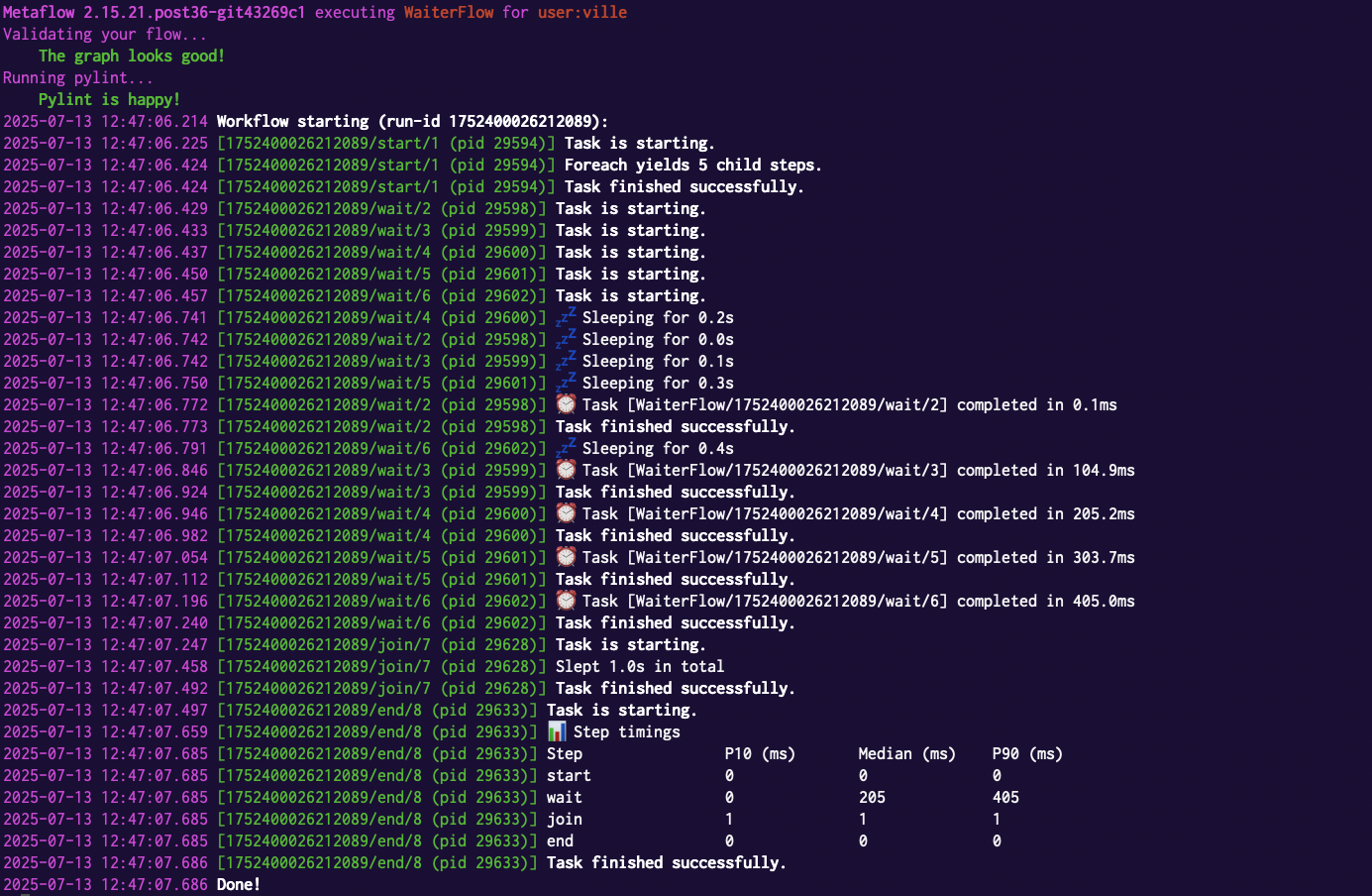Custom Decorators
You can find all decorator examples in this repository.
Custom decorators let you:
Run code before the user-defined step,
Run code after the user-defined step,
Run code on failure of the user-defined step,
Replace the user-defined step with custom logic,
Notably, in any of the above cases, you can read, write, or delete artifacts to maintain state within and across steps, as well as to process inputs and outputs from your decorator. This page describes the basic usage of custom decorators covering the before and after cases. The next page, Advanced Custom Decorators, covers the last two patterns.
Defining a custom decorator
A custom step decorator is a Python generator function, annotated with @user_step_decorator:
import time
from metaflow import user_step_decorator, current
@user_step_decorator
def my_profile(step_name, flow, inputs=None, attributes=None):
start = time.time()
yield
duration = 1000 * (time.time() - start)
print(f"⏰ Task [{current.pathspec}] completed in {duration:.1f}ms")
The function is passed four arguments:
step_name- the step that is being decorated.flow- aFlowSpecobject, corresponding toselfin steps - used to access artifacts.inputs- a list ofinputsif the decorated function is a join step.attributes- a dictionary of keyword arguments passed to the decorator.
Any code before yield is executed before the user-defined step code. Code after it is executed
after the user's code has executed successfully. As an example, the @my_profile decorator above
measures and prints the execution time of the user code in milliseconds. Save it to a file, myprofile.py.
Using a custom decorator
You can use the decorator in any Metaflow flow simply by importing it
from myprofile import my_profile
and by annotating steps with @my_profile. Alternatively, you can attach the decorator automatically
to all steps by executing a flow with
python myflow.py run --with myprofile.my_profile
You can test the above with this flow:
import time
from metaflow import FlowSpec, step
from myprofiler import my_profile
class WaiterFlow(FlowSpec):
@step
def start(self):
self.waiters = list(range(5))
self.next(self.wait, foreach='waiters')
@my_profile
@step
def wait(self):
self.duration = self.input / 10
print(f"💤 Sleeping for {self.duration}s")
time.sleep(self.duration)
self.next(self.join)
@step
def join(self, inputs):
self.total = sum(inp.duration for inp in inputs)
print(f"Slept {self.total}s in total")
self.next(self.end)
@step
def end(self):
pass
if __name__ == '__main__':
WaiterFlow()
Save it as waiterflow.py and run it as usual:
python waiterflow.py run
You can also test
python waiterflow.py run --with myprofiler.my_profile
Using custom decorators when executing tasks remotely
Custom decorators don't require special treatment when executing tasks in
the cloud or when deploying flows to production -
they will get packaged automatically by Metaflow. You don't
even need to import the decorators if you add them with --with. Try it:
python waiterflow.py run --with myprofiler.my_profile --with kubernetes
or equally --with batch. Notably, the decorators don't have to exist in the same directory
hierarchy as your flow code, nor you have to include them with @pypi.
If your custom decorator is part of a Python package with multiple modules, Metaflow will automatically package the entire package. This allows you to implement advanced decorators as well-structured Python packages, which can be distributed internally via your internal package repository or published to PyPI. If your decorator requires third-party dependencies, you can include them using a bundled @pypi decorator, as shown in
this example.
Configuring decorators and managing state
Your decorators may want to manage state across steps, or you may want to produce results that can be accessed after a run has completed. You can do this via artifacts.
In the example below, save it to statsprofiler.py, we aggregate timings from all tasks in an artifact,
timings. Note that we use hasattr to see if the artifact exists already, and we check the presence of
inputs to merge timings in a join step:
import time
from metaflow import user_step_decorator
from collections import defaultdict
@user_step_decorator
def stats_profile(step_name, flow, inputs=None, attributes=None):
start = time.time()
yield
duration = int(1000 * (time.time() - start))
if not hasattr(flow, "timings"):
flow.timings = defaultdict(list)
if inputs:
for inp in inputs:
for step, timings in inp.timings.items():
flow.timings[step].extend(timings)
flow.timings[step_name].append(duration)
if step_name == "end" and not attributes.get("silent"):
print_results(flow.timings)
def print_results(all_timings):
print("📊 Step timings")
print(f"{'Step':<20}{'P10 (ms)':<15}{'Median (ms)':<15}{'P90 (ms)':<15}")
for step, timings in all_timings.items():
timings.sort()
n = len(timings)
p10 = timings[int(n * 0.1)]
median = timings[n // 2]
p90 = timings[int(n * 0.9)]
print(f"{step:<20}{p10:<15}{median:<15}{p90:<15}")
You can also configure the decorator behavior through attributes. Here, you can set
@stats_profile(silent=True)
to suppress outputting of results. Or, on the command line:
python waiterflow.py run --with statsprofiler.stats_profile:silent=1
You can then use the Client API as usual to
access the results in the timings artifact.

Exposing an API to the user code
A custom decorator can expose an API to user code via a temporary artifact. This allows you to maintain state using arbitrarily complex Python objects - such as instances of custom classes - that may not be easily serializable or retrievable as stable artifacts through the Client API.
This example, traceprofiler.py, exposes a Python context manager
through self.trace which the user code can use to collect timings of arbitrary sections of code.
import time
from metaflow import user_step_decorator
from collections import defaultdict
@user_step_decorator
def trace_profile(step_name, flow, inputs=None, attributes=None):
flow.trace = TraceCollector
yield
del flow.trace
flow.timings = TraceCollector.timings
for name, timings in TraceCollector.timings.items():
print(f"Trace: {name} - Total: {int(timings)}ms")
class TraceCollector(object):
timings = defaultdict(int)
def __init__(self, name):
self.name = name
def __enter__(self):
self.start = time.time()
def __exit__(self, type, value, traceback):
self.timings[self.name] += 1000 * (time.time() - self.start)
It wouldn't make sense to store the context manager class, TraceCollector, as an artifact so we delete
it (del flow.trace) after the user code has finished and only store a dictionary of results as an artifact.
The following flow demonstrates the with self.trace in action:
import time
from metaflow import FlowSpec, step
from traceprofiler import trace_profile
class TracingFlow(FlowSpec):
@trace_profile
@step
def start(self):
for i in range(10):
with self.trace('database access'):
time.sleep(0.1)
with self.trace('process data'):
time.sleep(0.5)
self.next(self.end)
@step
def end(self):
pass
if __name__ == '__main__':
TracingFlow()